Chess endgame Bibles
After assembling a list of best chess tactical books in the previous post and after writing a first post in the “endgame domain”, we thought that the next logical step is making a similar list with the best endgame literature.
Our personal opinion is that books are the best source for endgame study and that the alternative sources are not that efficient as compared to the opening or middle game study:
- Modern chess databases have huge opening books that are regularly updated. Therefore, one has instant access to every relevant theoretical game played in a certain opening line. It is true that with such an approach one doesn’t absorb ideas behind certain opening moves. But since virtually every prominent game gets annotated in great detail, it is also much easier to understand the purpose of a specific move than it was ever before.
- As already mentioned in the previous article, exercising tactics is also more available than ever before. Just search the internet or install an app and voila. The infinite amount of chess puzzles.
- A great majority of games concludes before reaching the endgame. That relates especially to blitz games, but long games also aren’t a big exception. Therefore, one doesn’t get the opportunity to practice his endgame play and correct deficiencies so often.
Additionaly, many people, myself included, consider endgames tedious and boring, and never bother to study them properly.
However, I think that investing some time in the endgames will well repay the study. I think that reading just a single book from this list will significantly improve your understanding of the endgames.
And if you need an extra motivation, Rise Against always gets ME pumped up.
Silman’s Complete Endgame Course: From Beginner to Master – Jeremy Silman
It is always hard to choose the first thing to put on a list of anything.
In our case, we have tried to choose the book that is perhaps most useful to beginners.
Because Silman’s Complete Endgame Course is definitely the book that is best suited for someone who has never played a serious game of chess.
The main concept of the book is that Silman divides the content into nine chapters, each being suited for the players of different rating.
Every chapter covers various field of endgame play, depending on how high the base rating of the chapter is.
The book is intended as a textbook. As a player progresses in his chess strength, he can progress through the material in book as well, gradually learning and deepening his understanding and strength.
Of course, for someone who is not complete beginner, the book also has something to offer, since the highest rated chapter is intended for player of master calibre.
However, we are of opinion that there is superior choice for someone who has some basic idea about what he should do in the endgame.
Basic Chess Endgames
Historicaly probably most popular and most established book about the endgame.
One can hardly go wrong with choosing this classic, although a word of caution is required. Due to it’s release date (1941!), it can be considered somewhat old fashioned.
It is well known that the original edition contained some inaccuracies. According to most of the reviewers, GM Pal Benko hasn’t corrected every single line throughout the book.
However, when I was personally reading it, I didn’t find some radical and obvious mistakes. It is arguable whether I could have benefited MORE from some other book, but I still think that Fine’s is a must for any self respected chess player.
In addition, it IS somewhat cheaper than some more modern books examined below.
Fundamental Chess Endgames
I will be honest and say that I haven’t fully read this book yet.
I have discovered it while I was doing my research for this list, and it has immediately found a way toward my Kindle device.
Because GM Karsten Müller is well known endgame expert who contributes regularly to the New in Chess magazine and other publications. I have complete faith in his capability, and apparently his book about endgames is considered by many as the most relevant endgame book these days.
So far, my personal impression coincides fully with the reviews and the opinion of community. Müller’s style is crystal and concise, the content follows a logical flow and everything is double checked on the engine.
Therefore, it definitely deserves a place on this list.
Understanding Chess Endgames
We have already met the name of John Nunn on our other list, but once again he gets a spot under the sun.
This time he treats us with a great endgame book in which he covers 100 endgame themes.
This books is excellent for studying and learning endgame principles. Because instead of the typical “Pawn and king endgames”, John Nunn bases his chapters on the very same principles.
For instance under the title Rook Endings, there are subtitles such as Extra Passed Pawn – Rook in front of the pawn, Extra Passed Pawn – Rook behind the Pawn, and many more.
It is very hard to compare this book directly to the others on this list.
But is certainly deserved to be mentioned here.
Dvoretsky’s Endgame Manual
The last, but not the least, another very famous book. Dvoretsky’s endgame manual was written by the world’s most famous chess trainer, Mark Dvoretsky, who unfortunately recently died at the age of 68.
The book is famous for a reason because it is definitely the most complex and thorough of all the books mentioned on this list.
The analysis are long and meticulous, the style is described as a “bit dry”, and the book can be rightfully described as highly technical.
Therefore, perhaps it is not the best choice for beginners and novices. But I think that it is ideal for anyone above the first category strength and that one can hardly miss by getting this monumental manual.
Fortunately, it is not as pricey as one might assume by reading things written above.


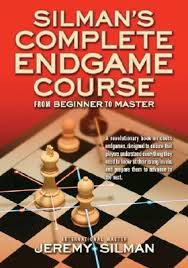
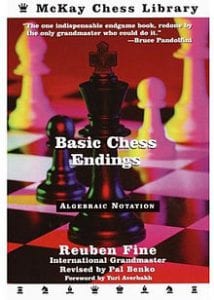
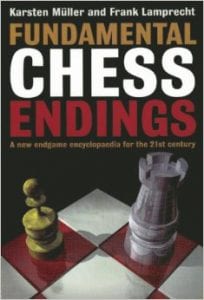
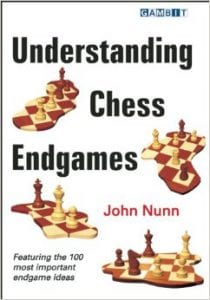
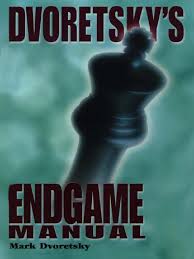
I have heard that dvoretsky’s endgame manual is great for someone studying to be a titled player